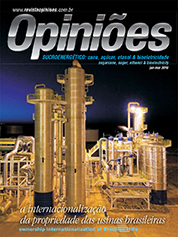Alessandro Baldoni
Vice-president of Morgan Stanley Dean Witter
Op-AA-23
Internationalization improves industry attractiveness
The Brazilian sugar and ethanol industry today faces a moment of strong interest of foreign companies and investors. This positive prospect bears some resemblance and many differences with the previous attractiveness wave, in the period from 2006 to 2007. At that time, ethanol was the leading character, since it had caught global attention and triggered a series of optimistic assumptions supported by euphoria.
Forecasts were that within a short period of time it would become a global commodity, being adopted in many places around the world. Accordingly, approximately 90 projects of new mills were announced, almost all of which dedicated exclusively to the production of ethanol for export. Most projects concentrated on Brazil’s Midwestern region, particularly the State of Goiás, and entailed a strong stake of foreign companies, whether as a controlling or minority interest, in projects carried out by traditional Brazilian groups.
The issue is that the region at the time lacked and still lacks the proper infrastructure for product flow. This could be solved with the construction of ethanol pipelines connecting the State of Goiás to the Southeastern ports. Investors and entrepreneurs intended to sell ethanol in the Midwest until the export infrastructure would be ready some years later.
What happened was that the region eventually recorded a strong surplus and the ethanol pipelines were never completed. As a result, many projects were postponed or even cancelled and the prospects are that perhaps it will take a bit longer until this expansion movement recovers all the capital invested. The current moment is driven by a strong increase in prices of sugar in 2009 and beginning of 2010, when the commodity reached an all-time threedecade peak.
It is still expected that ethanol will become a global commodity, but not in the short-term. It may rather take some years to happen. Unlike that time, the current environment fails to foster the aggressive construction of new projects. Foreign moves are restricted to the acquisition of existing mills or groups. The leading roles in business announced so far are performed by companies facing some kind of financial uneasiness, which improves the liquidity of the industry as a whole.
The process of internationalization is extremely positive for the sugar and ethanol industry. Foreign companies bring in not only the initial proceeds of the acquisition itself, but also new funds for expansion and investment in technology and processes. Additionally, they may also bring to Brazil new financing lines extended by foreign institutions. Benefits are not limited to capital.
The presence of players with operations in several parts of the world may also help speed up the opening of other countries to Brazilian ethanol, thus helping streamline this product’s internationalization process. New global competitors also help the development of new technologies that may render the industry even more efficient, such as second generation ethanol.
They could also speed up investments in cogeneration and even logistics, which still looms as one of the industry’s major challenges. It is important to emphasize that the internationalization process results not only from direct acquisitions, but also from transactions in the capital markets. The industry records only three publicly-held companies in which foreign investors account for their major free-float.
There is a trend towards increasing foreign interest, which would help consolidate the industry, and this consolidation is expected to prompt new companies into going public. Equity investors from all around the world have increased their investment interest in this industry, but few options lie before them. In this sense, new offerings would certainly be most welcome and would probably face no placement hurdles.
The sugar and ethanol industry is expected to face a situation that has already been felt in other sectors of the Brazilian economy, where consolidation, strongly driven by international players, should push all participants into being more productive and competitive, enabling a more organized and attractive industry, which will generate a higher ROIC than currently recorded.




